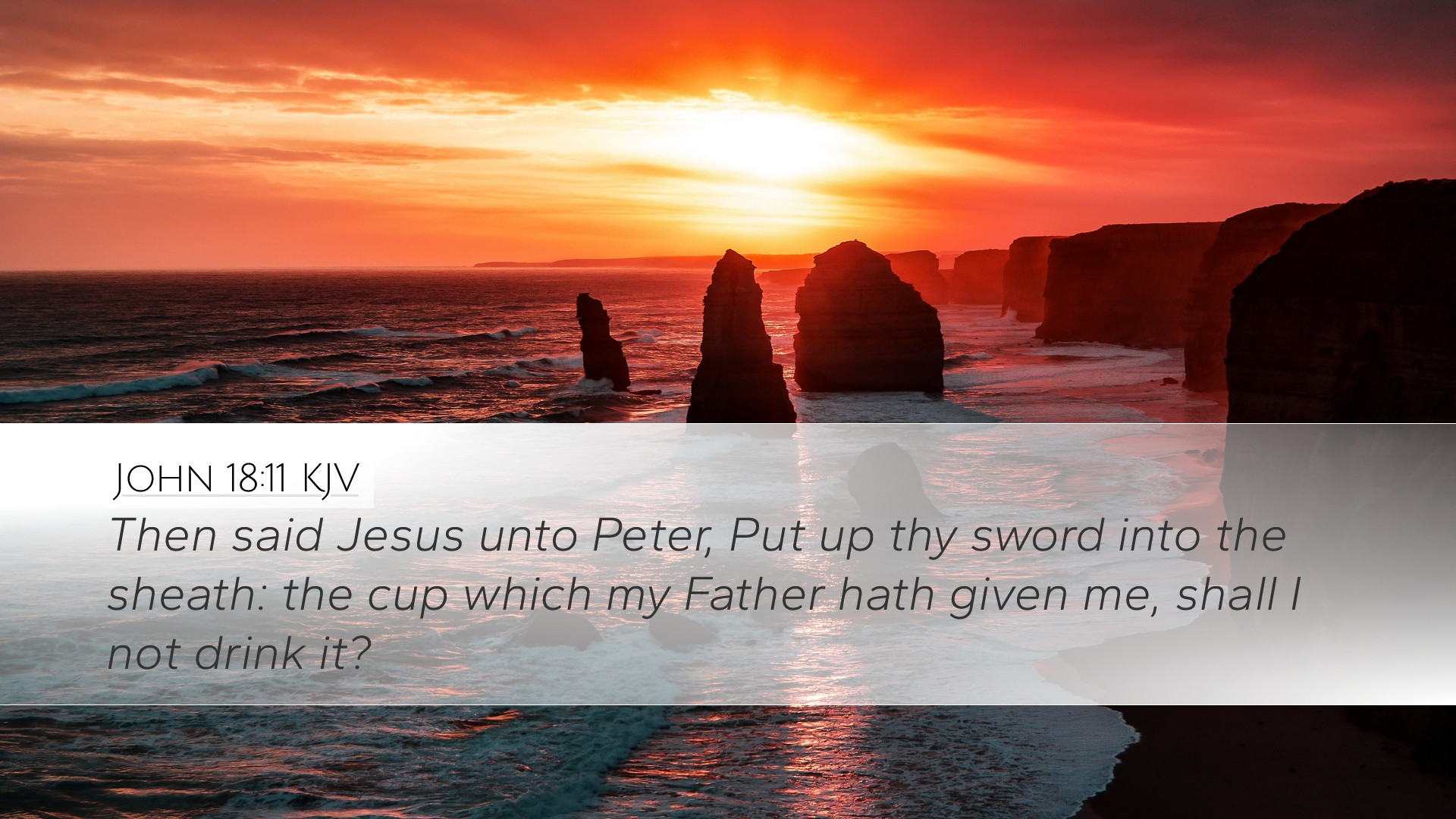Commentary on John 18:11
Verse: John 18:11 - "Jesus therefore said to Peter, 'Put your sword into the sheath. The cup which my Father hath given me, shall I not drink it?'"
Introduction
This pivotal moment in the Gospel of John encapsulates the tension between divine will and human action. It occurs in the context of Jesus' arrest, where Peter, in a fervent act of defense, tries to prevent Jesus from being seized. This passage not only speaks to the nature of discipleship but also highlights the overarching theme of divine providence in the narrative of Christ’s passion.
Commentary Overview
The commentaries of Matthew Henry, Albert Barnes, and Adam Clarke provide insightful perspectives on this verse. They illuminate key theological themes and the implications of Christ's words for His disciples and for all believers.
Insights from Matthew Henry
1. The Reprimand of Peter: Henry emphasizes that Jesus' command to Peter illustrates the folly of trying to thwart God’s divine plan. In doing so, he aligns with the biblical principle that attempts to circumvent God's will often lead to futile outcomes.
2. The Symbolic Meaning of the Sword: Henry posits that the sword represents a broader human tendency to resort to violence and self-preservation. Christ’s rebuke serves as a reminder that the Kingdom He is establishing transcends earthly power dynamics.
3. Divine Providence: He highlights Jesus’ acknowledgment of the 'cup' provided by the Father, a metaphor for His impending suffering and sacrifice. This indicates a profound understanding of the necessity of His Passion for the redemption of humanity.
Insights from Albert Barnes
1. The Act of Self-Defense: Barnes points out that Peter's impulsive action was not only misguided but also indicative of a misunderstanding of Jesus’ mission. Instead of taking matters into his own hands, Peter should have recognized the necessity of Jesus’ suffering.
2. Historical Context: Barnes places this incident within the broader narrative of the attitudes toward Jesus among the Jews and Romans, indicating that violence was a common response to threats against power. Jesus’ pacifism is thus seen as revolutionary.
3. Implicit Authority of Jesus: Barnes notes that Jesus’ assertion of His authority over the situation—commanding Peter to sheath his sword—is a vital point. Despite the chaotic circumstances of His arrest, Jesus remains sovereign and in control of the unfolding events.
Insights from Adam Clarke
1. Theological Implications: Clarke emphasizes the theological ramifications of Jesus drinking the cup given by the Father, which signifies His acceptance of the suffering and sacrifice required for salvation. This reflects the deep unity within the Trinity regarding humanity’s redemption.
2. The Nature of True Discipleship: Clarke’s exegesis suggests that true discipleship involves submission to God's will rather than positioning oneself against it. This moment serves as a critical lesson for all followers of Christ about the importance of obedience over rebellion.
3. Reflection on Suffering: He also reflects on the nature of suffering as a means of deeper communion with God. Clerical commentary sees this moment as an exemplar of how believers are called to approach their sufferings in light of submission to God’s purposes.
Application for Pastors and Theologians
For pastors and theologians, John 18:11 serves as a rich text for exploring themes of obedience, divine sovereignty, and the nature of spiritual warfare. It extends an invitation to reflect on the tension between human instinct and divine purpose. Key applications include:
- Encouragement of Patient Trust: Encouraging congregants to trust in God's plan, even amidst chaos, contributes to a robust understanding of faith.
- Confronting Violence: Addressing the temptation to respond to injustice with violence, promoting peace and submission to God’s way of justice instead.
- Understanding Suffering: Teaching about the role of suffering in the life of a believer fosters resilience and deepens faith.
Conclusion
John 18:11 is a profound reminder of Jesus’ commitment to fulfilling the will of the Father, even in the face of imminent suffering. The insights gleaned from historical commentaries highlight the importance of understanding our role as disciples in the context of Christ's mission. As we meditate on this passage, we are called to re-evaluate our responses to life's challenges and to trust in the divine plan that unfolds even through our trials.


